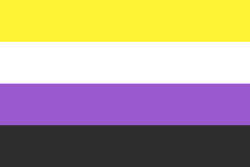非二元性別
| ||||||
非二元性別,是一個傘狀詞(umbrella term),旗下包含了所有不能完全被二元性別涵蓋的性別認同或性別表達。這個詞彙也用來描述所有性別認同落在性別二元之外、不能明確被二元性別之一給定義的人。
 Meaning 黃色:沒辦法被二元定義的性別。白色:多種或全部的性別。紫色:在女性與男性之間、或混合了女性與男性的性別。黑色:沒有性別。 | |
| Related identities | transgender, genderqueer |
|---|---|
| Click here to see alternative flags! | |
非二元這個傘狀詞彙跟性別酷兒這個詞有著類似的面向,所以有很多非二元者同時也覺得自己是性別酷兒。但是這兩個詞還是有不同的定義與內涵。此外,性別酷兒一詞比起非二元性別一詞更早被使用,至少早了十年。
凱・若宛(Kye Rowan)在 2014 年設計了非二元旗,如右圖所示。這個旗子意思是「是那些對性別酷兒旗沒有認同感的非二元者的象徵。這個旗子希望跟瑪麗蓮・若希(Marilyn Roxie)的性別酷兒旗並存,而不是取代它。這個旗子有四個條紋。從上到下,分別是黃色,白色,紫色,與黑色。黃色表示沒辦法被二元定義的性別,因為黃色通常是用來醒目標示自己的顏色。白色表示有多種或全部的性別的人,因為白色在光學上表示總和的顏色或光。紫色代表在女性與男性之間、或混合了女性與男性的性別,因為紫色是傳統代表男性與女性顏色的混合色。紫色也通常是表示流動或獨特的非二元者們。黑色則是表達沒有性別、活在性別之外的人,因為黑色在光學上是代表沒有顏色、沒有光的狀態。」非二元旗以及性別酷兒旗都是給非二元性別者可以選擇的選項,用來象徵他們自己,以及用不同方式來呈現非二元的性別。
歷史
「見主文章「非二元性別的歷史」」
凱・若宛(Kye Rowan)在 2014 年設計了非二元旗,如右圖所示。這個旗子意思是「是那些對性別酷兒旗沒有認同感的非二元者的象徵。這個旗子希望跟瑪麗蓮・若希(Marilyn Roxie)的性別酷兒旗並存,而不是取代它。這個旗子有四個條紋。從上到下,分別是黃色,白色,紫色,與黑色。黃色表示沒辦法被二元定義的性別,因為黃色通常是用來醒目標示自己的顏色。白色表示有多種或全部的性別的人,因為白色在光學上表示總和的顏色或光。紫色代表在女性與男性之間、或混合了女性與男性的性別,因為紫色是傳統代表男性與女性顏色的混合色。紫色也通常是表示流動或獨特的非二元者們。黑色則是表達沒有性別、活在性別之外的人,因為黑色在光學上是代表沒有顏色、沒有光的狀態。」非二元旗以及性別酷兒旗都是給非二元性別者可以選擇的選項,用來象徵他們自己,以及用不同方式來呈現非二元的性別。
在 2014 年,「非二元」是 Facebook 上性別選項中 56 個選項的其中一個。
「小元(enby)」一詞的使用
「小元(enby, 複數型為 enbies,源自 N-B)」是一個可以用來稱呼非二元者的暱稱。最早可能是起源於 Tumblr,有些非二元者用這個簡短稱呼來與「小男孩 boy」或「小女孩 girl」並列。也因此,有些人認為這個暱稱並不能完全用來稱呼所有非二元者,比較像是稱呼一些青少年或較年輕的非二元者。《2020 年性別共識》當中也顯示出在年紀愈增的非二元者群體中,使用「小元」自稱的比例愈低。
非二元身分認同
There is more information about this topic here: List_of_nonbinary_identities
在非二元的傘狀詞彙下有一些常見的身分認同如下,僅為舉例,事實上並不限於這些:
「無性別」,也被稱為「無性」,「非性別」:沒有性別認同或沒有任何可以表達的性別(類似或有時可以互換的詞是:性別中立、中性) 「雌雄同體」,又稱「性別雌雄同體」:認同或表達落於二元男女性別或陽剛與陰柔之間(有時可互換的詞是:交織性別) 「性別中立」,也稱「中立性別」:有中性的性別認同或性別表達,或是使用性別中性代名詞 「性別酷兒」:非典型性別認同或性別表現。雖然性別酷兒一詞一開始是被當成一個大的傘狀總稱詞彙,但他也可以用來當成性別認同的一種。 「交織性別」:落於二元男女性別或陽剛與陰柔之間。 「中性」:非性別化的、中性的,通常(但並不是所有人都)也蘊含一種將性別特徵隱藏起來的渴望。 「非二元」:用來表示所有在二元性別之外、並且沒有更多更具體的認同的人。也用來表示有這種認同的人。此外也有一些人認同為非二元T、非二元跨女等身分。 「跨性別」:認同落在所有性別與性別氣質超出社會認定的順性別定義的人。(這個詞彙可以包含二元的跨性別與非二元的跨性別)
你可以在「非二元身分清單」當中閱讀更多
Nonbinary presentation and expression
There is no single or 'correct' way to perform a nonbinary gender. Most nonbinary people are primarily motivated by the desire to be comfortable and true to themselves rather than attempting to follow any particular gender role. Nonbinary people may or may not experience gender dysphoria or may experience only bodily or social dysphoria. Nonbinary is a wide umbrella term covering a large number of gender identities and expressions. Whichever way any particular nonbinary person needs or chooses to present, express or perform their gender is as valid as any other.
Not all nonbinary people experience gender dysphoria or follow the 'transition' narrative. Some feel that there is no social role or body to 'transition' to and so simply focus on being themselves.
Androgynous or gender neutral presentation
Some nonbinary people may choose or need to present an androgynous or gender neutral gender expression; perhaps choosing to hide, remove or blend gender cues. This is personal to each individual and is not any more nonbinary than any other way of expressing a nonbinary gender.
Some nonbinary people experience bodily dysphoria relating to certain primary or secondary sexual characteristics. The act of obscuring, removing or replacing these sexual characteristics in order to reduce gender dysphoria may result in physical androgyny without the individual having set out to specifically obtain an androgynous presentation.
Genderfuck
Some nonbinary people may choose or need to present a 'clashing' combination of gender cues that are incongruous, challenging or shocking to those who expect others to fit the gender binary. For example, combining a beard with makeup and a padded bra. This practice of transgressively breaking the rules of gender presentation is known as genderfuck, genderfucking or sometimes genderpunk.
Gender neutral language
Some nonbinary people prefer to be referred to using gender neutral language and pronouns. Some choose a gender neutral title such as Mx or Misc for formal communications. Others may opt for no title.
Expanding or subverting binary gender roles and language
Some nonbinary people prefer to expand on or subvert what is considered socially acceptable for their assigned gender. This may involve preferring binary pronouns while crossdressing, blending or mixing gender cues or otherwise subverting the expectations society places on that gender role. Some may consider this to be a political act, for others this is simply an expression of self identity or personality. Some nonbinary people have no preference for gender neutral language but instead have a preference against the language and pronouns associated with the gender they were assigned at birth.
Notable nonbinary people
See main article: Notable nonbinary people
There are many more notable people who have a gender identity outside of the binary. The following are only some of those notable people who specifically use the word "nonbinary" for themselves.
- Olly Alexander, the lead singer and songwriter for electropop band Years and Years.[3]
- Kate Bornstein, an influential writer on gender theory, publishing books on the subject from the 1990s to the present.[4]
- Amanda Stenberg, a singer and actor who has won the BET Awards for YoungStar Award.[5][6]
- Rebecca Sugar (a nonbinary woman) is a writer, songwriter, and artist whose work on the cartoon series Adventure Time and Steven Universe has earned her six Primetime Emmy Award nominations.[7]
- Sam Smith, a renowned English singer, Grammy winner and nominee. They came out as non-binary and changed their pronouns to they/them in September of 2019. [8]
Nonbinary characters in fiction
See main article: Nonbinary gender in fiction
There are many more nonbinary characters in fiction who have a gender identity outside of the binary. The following are only some of those characters who are specifically called by the word "nonbinary," either in their canon, or by their creators.
Please expand this section, giving quotes that show that the characters are specifically called by the word "nonbinary."
See also
References
- ↑ This quote is a snippet from an answer to the survey conducted in the year 2018. Note for editors: the text of the quote, as well as the name, age and gender identity of its author shouldn't be changed.
- ↑ Cite error: Invalid
<ref>tag; no text was provided for refs namedGC20-enby - ↑ Years & Years: Inspiring - #PlessPlayForPride Spotify, June 7 2016
- ↑ Retrieved November 11, 2019. http://katebornstein.com
- ↑ hi folks, @dazedfields and I are organizing a workshop on feminism, amandla.tumblr.com, March 2, 2016
- ↑ Hunger Games actress says she 'doesn't feel like a woman all the time', Gay Star News, March 4, 2016
- ↑ https://io9.gizmodo.com/steven-universes-rebecca-sugar-on-how-she-expresses-her-1827624015?IR=T
- ↑ https://www.bbc.com/news/entertainment-arts-49688123